“Doggy Dan, my dog is starting to bite and it's freaking me out!” If you're ready to be DONE with your dog's biting behavior, this guide will help you solve it FAST.
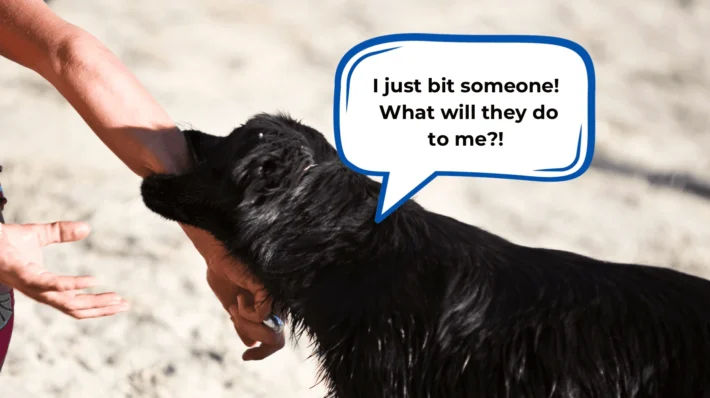
“Doggy Dan, my dog bit me. Is there hope? Should I worry? What do I do next?
Dog owners, I understand the concern that comes with a dog exhibiting biting behavior, especially when it starts biting out of nowhere. I also recognize the classic advice to dog owners: when a dog bites, put them down.
In this blog, I will explain the best steps to take when your dog bites you.
Let's start!
Key Takeaways
- Dogs bite for various reasons, including poor socialization, old age, illness, lack of training, human error, over-excitement, fear, and the need to protect. Understanding these reasons is critical to preventing dog bites.
- If your dog bites, seek professional training to address the underlying cause and prevent future incidents. Establishing yourself as the leader using positive reinforcement techniques is also crucial.
- Pay attention to your dog's body language to anticipate potential bites. Growling, snapping, baring teeth, and stiff body language are all warning signs of aggression.
Table of Contents
JOIN THIS FREE WEBINAR AND STOP YOUR DOG'S BITING BEHAVIOR FOR GOOD!Why Dogs Bite People
Dogs are supposed to be delightful family members. In fact, dogs have exhibited family-friendly personality traits for eons.
That said, several factors can contribute to dogs taking on unusually aggressive traits. Truly understanding the behavior can help prevent dog bites.
To understand why dogs bite, let's examine some factors of dog aggression (including biting!).
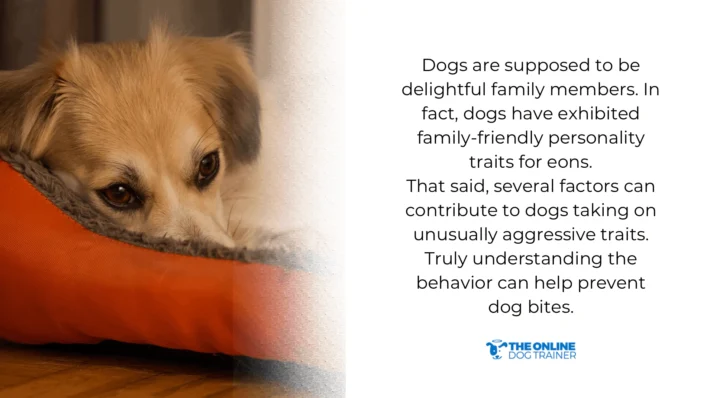
#1 Poor Socialization
Sadly, one of the biggest reasons dogs become aggressive is poor socialization. Most dog bites are triggered by fear of an unfamiliar dog or person!
While I know you would never abuse your dog, it's possible that if you've rescued a pup, he may have had a difficult past.
And a dog with an unhealthy past can be very protective, agitated, and anxious.
In fact, many rescue animals have had a tough start to life…
- Abused dogs.
- Many have gone hungry.
- Some grew up as fighting dogs and guard dogs.
- Some were surrounded by other dogs that bite people.
However, many more have neglectful dog owners who don't provide the socialization they need with other people and dogs.
I don't say this to scare you away from adopting a rescue.
Most rescue pups are delightful animals who become wonderful family members. But, some dogs will need patience and time to build confidence.
Listen: An Inspiring Story of Dog Adoption with Sean McCormack
It's important to see if you can get info on a dog's history to make sure he will be a good fit for your family.
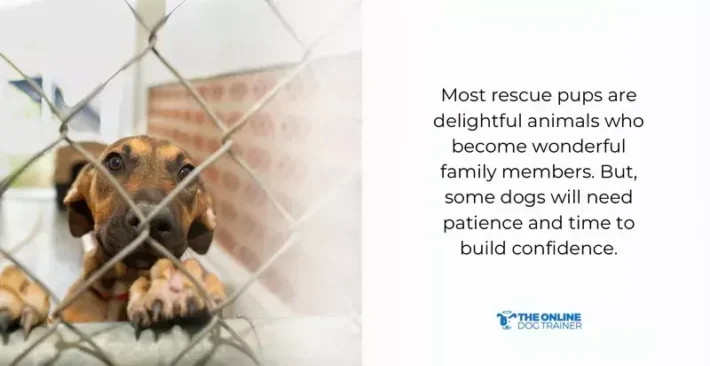
These pups who need socialization need time and patience to familiarize themselves with all the strange things we understand.
Things such as umbrellas, big loud voices, funny-looking hats, loud little kids running around all day, and everything else we take for granted!
Given that time to adjust, they can become the most loyal of dogs, just like any other.
If you think your dog has a reactivity problem from poor socialization, I have a free webinar that will help your dog overcome reactivity!
FREE MASTERCLASS: THE MOST EFFECTIVE WAY IN CALMING AGGRESSIVE DOGS#2 Old Age
The older people get, the less nonsense they seem to tolerate. The same can be true with dogs.
It's possible that you've owned a dog for a really long time — a dog who has been tolerant of loud noises, busy households, and kids. Then, suddenly, your dog snaps without warning.

As dogs get older, some of them naturally tend to become grumpier, and older dogs can exhibit more biting tendencies.
If you want to build tolerance so your dog remains more chilled out and less stressed, check out my program, The Dog Calming Code, which will do just that.
(Or, if you have a puppy, you can start building a solid foundation now to prevent these issues from occurring in the first place. My Puppy Coach training program can help you with that.)
And, if you already have an older, grumpy dog, it's essential that you keep an eye on kids or strangers who spend time around your dog to make sure they don't try to wind him up. (Oh, and it's not too late to introduce your older dog to the right training. The Dog Calming Code can help!)
THIS WEBINAR HELPS YOU STOP YOUR DOG'S BITING BEHAVIOR!#3 Dogs Bite When They Are Sick or Feeling Unwell
A dog that is sick or in pain will want to be alone.
If they are bothered, they may resort to biting as an attempt to protect themselves or ward off overwhelming distractions.
If your friendly dog suddenly becomes aggressive or showing sites of aggressive biting due to sickness, the assistance of a veterinarian can help.
#4 When Dogs Bite, Poor Training Can Be a Reason
If a dog has never been trained NOT to bite as a puppy, there's a good chance he will continue to bite as an adult.
This is why investing in dog training is so important.
As part of your dog ownership, it is very important to find a comprehensive training program that helps you stop any mouthing of you or your clothing at an early age. My suggestion is that all dog-mouthing should stop around 16 weeks of age.
If you currently have a puppy at home, I encourage you to get started with my Puppy Coach training program right away!
#5 Human Error
While all four reasons we've discussed so far are true reasons why dogs bite, the biggest reason has to be human error.
You see, most dogs have no desire to bite until they are provoked.
Sometimes dogs give us warning signs that they are annoyed.
For example, if a little kid is pulling on a dog's tail, a dog may snarl as a warning.
Other times, it's not as easy to tell.
For example, a mama dog might be protecting puppies that you're not aware of.
This is one of those tricky examples of a time when a dog might bite in regards to fear rather than aggression.
Anytime you're around a dog, it's important to pay attention to body language.
Understanding that dog communication includes its tail, heckles, teeth, and body stance is a good way to prevent accidental bites.
#6 Over-excitement
Dogs, like people, can easily become over-excited.
Maybe your dog gets over excited when he is chasing a ball, barking at the fence, or when food is about to be served.
Sometimes, when people get excited and when our adrenaline is pumping, we do or say things that we regret.
Dogs are no different!
So, if you work on helping dogs calm down, the less of a chance there is of your dogs accidentally snapping!
If you are struggling with an overexcited dog, again my program The Dog Calming Code is undoubtedly going to help.
GET DOGGY DAN'S BESTSELLING PROGRAM FOR FREE!#7 Fear and the Need to Protect
Our world can be a strange place for dogs and much of what goes on they do NOT understand.
When a dog bites, all they know is that they're doing what comes natural to them: which is protecting you and the home.
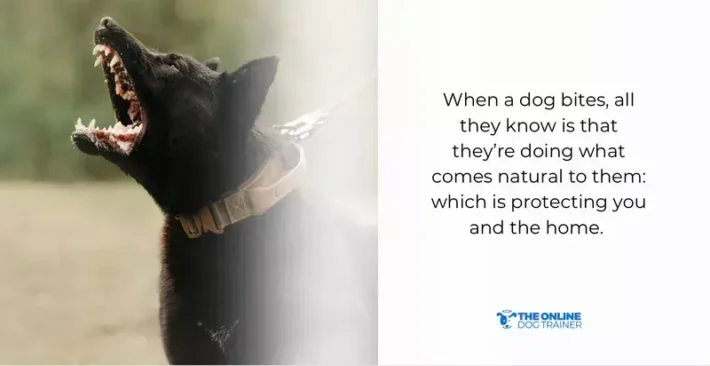
Is the UPS guy delivering flowers welcome or not?
Are the visitors really not posing any threat?
Is the stranger really a friend?
It can all be confusing — and frightening — to your dog.
A lot of what will help your dog is showing him that you have got it all under control and are in fact in charge.
This is why the core of my Dog Calming Code™️ program is teaching you — dear dog owner — how to help your dog understand that you're in charge. That you've got it all under control!
First Aid For When Dog Bite Accidents Happen
Dog bite injuries, no matter how minor they seem, demand immediate attention. Here's what you need to know:
#1: Clean the Bite Wounds
Wash the bite wound gently with mild soap and water. This helps remove dirt and bacteria, reducing the risk of infection. Ask for the best dog bite treatment as soon as possible.
#2: Control Bleeding
Apply pressure to the puncture wound with a clean cloth to stop any bleeding. If the bleeding is severe or doesn't stop, seek emergency medical attention.
#3: Seek Medical Evaluation
It's crucial to see a doctor or visit an emergency room, even for seemingly minor bites. They can assess the wound, provide proper wound care with emergency medicine, and determine if you need further treatment, like using an antibiotic ointment or a tetanus shot.
#4: Rabies Prevention
Rabies is a serious concern, as is any animal bite. Your doctor will assess your risk and may recommend a rabies vaccination if necessary.
#5: Watch for Infection
Keep a close eye on the bite wound. Remember that if you have a weakened immune system, it's recommended to be on the lookout for infection. If you notice any signs of infection, such as redness, swelling, pus, or increasing pain, seek medical advice immediately.
#6: Contact Animal Control For Serious Cases
A dog attack involving a stray dog or an uncontrollable dog requires a safety intervention. Call animal control if you think you're in a high-risk situation.
What To Do If A Dog Bites: My Dog Bit Someone… How Can I Help My Dog?
Now that we've covered the reasons that dogs bite, it's time to answer the age-old question…what do I do when my dog bites someone or something?
Before I begin, I want to make it clear that every dog and every situation that led up to a dog biting is different.
As a dog owner, it's your job to determine the best course of action as to what needs to happen to keep yourself and your friends/family safe.
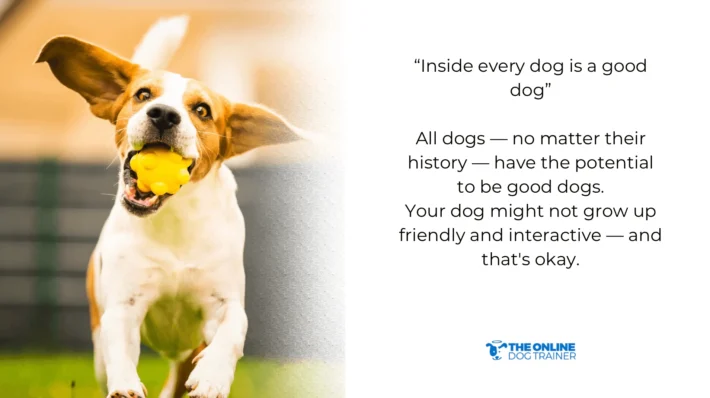
That being said, here is something I want every dog owner to know.
“Inside every dog is a good dog”
All dogs — no matter their history — have the potential to be good dogs.
Your dog might not grow up friendly and interactive — and that's okay.
However, they certainly can be trained not to be seriously aggressive to people without provocation.
While biting is a serious issue that should not be taken lightly, there are things you can do to correct the behavior.
FREE WEBCLASS ON HOW YOU CAN REVERSE DOG REACTIVITY WITHOUT STRESSStep #1: If Your Dog Has Bitten Someone, Your First Step Should Be To Hire A Professional Dog Trainer Or Find Some Appropriate Training.
An experienced dog handler may be able to help you uncover the reason behind why your dog became aggressive and can help you put training in place to ensure it never happens again.
Without training, the issue will not get better. So please take things seriously and get help sooner rather than later for the sake of both you and your dog.
Step #2: When Dogs Bite, It's Because They're Anxious and Scared and Just Acting on the Need to Protect
It's been proven since time began that when a dog growls and bares their teeth, threats flee. Growling and teeth-baring are a dog's way of shooing the threat away.
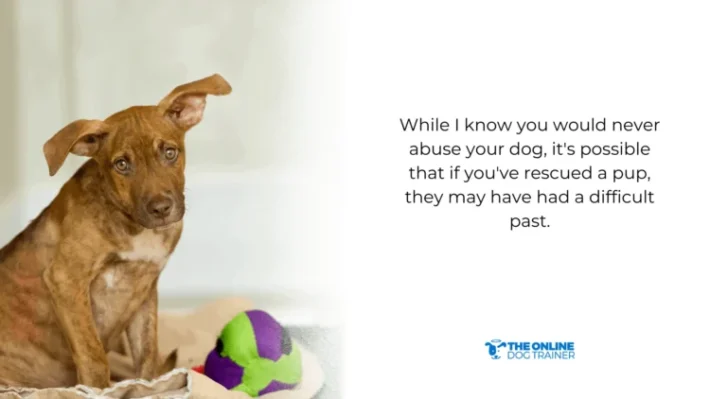
If your dog shows signs of biting, train them to know WHO IS IN CHARGE.
A dog who feels they're in charge thinks they NEED to protect YOU, your property, or the young (this includes kids and puppies).
You're probably thinking “But I own the house, I give them food, and take them to walks. What do you mean my dog thinks they're in charge?'
It's crucial for you to grasp that providing food and shelter doesn't automatically make you the leader. Understanding dog psychology is the key to effective training, as it's not how we humans learn, and it's not how dogs learn either.
You have to use dog psychology to earn your dog's trust and respect. From your dog's perspective, you have to set rules and boundaries that'll help your dog understand you're the leader. That's how you prove you're a leader.
Proving your leadership is essential to stop your dog from barking and biting to protect. Until you do, these unwanted behaviors will persist.
I highly recommend you check out The Dog Calming Code because this is what I share with every single client that I work with, and it's been remarkably successful. Through this online dog training program, I help dog owners train using dog psychology. Each action step in this program—from feeding your dog, giving affection, dealing with danger, doing things, and walking—will establish your leadership in your dog's eyes.
What To Do If A Dog Bites: 10 Dog Body Language Signs Indicating Dogs Are About To Bite
Most dog biting accidents are sudden and unpredictable. But dog-bite incidents are not totally unavoidable.
If you're welcoming guests to your home, visiting a home with dogs, or even playing with your own pet, it's important to be aware of the signs that indicate a dog is most likely to bite.
Sign #1: Growling
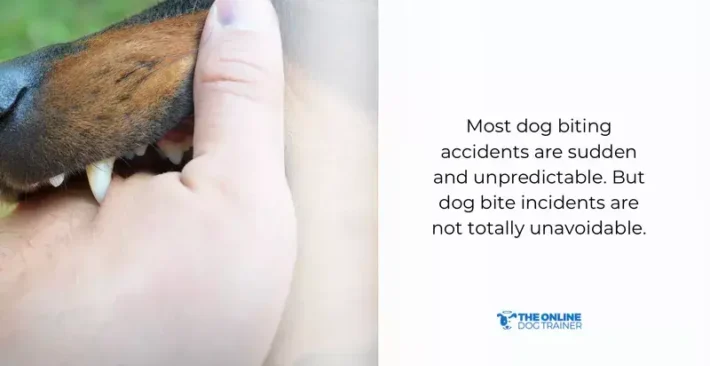
Sign #2: Snapping
The dog may snap its jaws or make quick biting motions toward the air or an object in close proximity. This can be a precursor to an actual bite.
Sign #3: Baring Teeth
Showing teeth, particularly with the lips pulled back, is a sign of aggression. The dog may also curl its upper lip, revealing its front teeth.
Sign #4: Stiff Body Language
Dogs about to bite may appear rigid, with tense muscles and a stiff posture. They may stand tall and erect, with their tail held high or rigid.
Sign #5: Raised Fur
When a dog's fur stands on end, especially along the back or neck, it indicates heightened arousal and potential aggression.
Sign #6: Direct Eye Contact
Intense, unwavering eye contact can be an indicator of aggression or a challenge. Some dogs may stare you down before biting.
Sign #7: A Stiffly Wagging or Rapidly Wagging Tail Held High
These different tail movements can signal a potentially aggressive or agitated state. Conversely, a tucked tail may indicate fear or anxiety.
Sign #8: Ears Back or Forward
Depending on the dog's breed and natural ear shape, they may pin their ears back against their head or thrust them forward, which can be a sign of aggression.
Sign #9: Freezing
A sudden halt in movement, often accompanied by a fixed gaze, can indicate the dog is assessing the situation and deciding how to react.
Sign #10: Attempts to Escape or Hide
Sometimes, dogs may try to retreat or hide when they feel threatened or anxious. If they are cornered or unable to escape, they may bite as a last resort.
FREE WEB CLASS: STOP DOG AGGRESSION IN JUST SEVEN DAYS!What To Do If A Dog Bites: Dog Bite Triggers
Trigger #1: Pain or Injury
Dogs in pain or discomfort may become more reactive and prone to biting. If they feel their injury or a sensitive area is being touched or approached, they may bite as a defensive reaction.
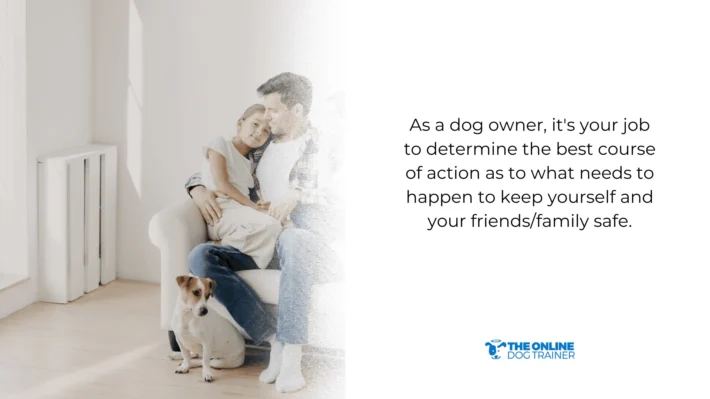
Trigger #2: Fear or Anxiety
Dogs that are fearful or anxious may resort to biting as a means of self-defense. They may feel threatened by unfamiliar people, animals, loud noises, or stressful situations.
Trigger #3: Protective Instincts
Dogs are naturally protective of their territory, resources, and family members. If they perceive a threat to their territory or loved ones, they may bite in an attempt to protect them.
Trigger #4: Maternal Instincts
Mother dogs with puppies may display aggression and bite if they perceive a threat to their offspring. They are particularly protective during the early weeks after giving birth.
Trigger #5: Resource Guarding
Dogs may bite if they feel their valued resources, such as food, toys, or a resting place, are being threatened or taken away.
Trigger #6: Lack of Socialization
Dogs that have not been adequately socialized may perceive everyday situations, such as encountering new people or animals, as threatening. This lack of exposure and social skills can increase the likelihood of defensive or aggressive behavior.
Trigger #7: Provocation or Harassment
Dogs that are teased, harassed, or subjected to rough handling may bite as a response to protect themselves. It's important to teach children and adults how to interact with dogs respectfully to avoid triggering aggressive behavior.
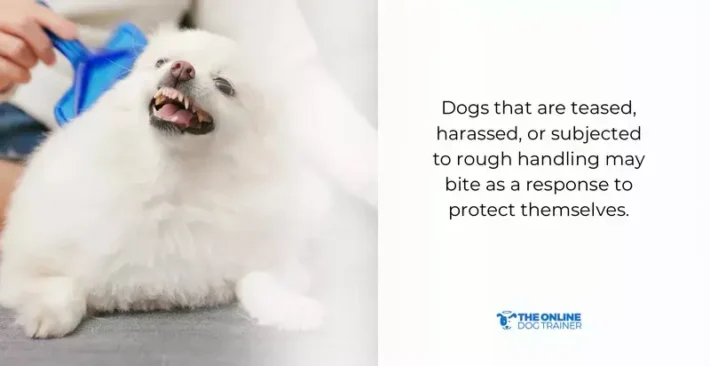
Trigger #8: Startle Response
If a dog is surprised or startled suddenly, it may instinctively react by biting. Approaching or touching a sleeping or resting dog without warning can trigger this response.
Trigger #9: Prey Drive
Some dogs have a strong prey drive, and if they see small animals, such as cats or squirrels, they may give chase and potentially bite in the process.
Trigger #10: Lack of Training or Socialization
Dogs that have not received proper training or socialization may have difficulty understanding appropriate behavior and communication. This can result in unpredictable reactions and an increased risk of biting.
If your dog's lack of training and socialization causes them to be reactive, you need to train them the right way. Join my free webinar to learn more!
What To Do If Your Dog Bites You
Pet parents, we can be caught off-guard when dog bites occur to us, especially when we know our dogs aren't inclined to be aggressive.
A pet owner may think their dog would never bite them.
They love their dog, and their dog loves them back. This makes them feel safe. But sometimes, even the nicest dogs can bite. Dogs are animals, and they can act in ways we don't expect. If a dog feels scared, hurt, or threatened, they might bite to protect themselves. This can happen even with dogs that have never bitten before.
So, how do you react if your dog bites you? It's understandable that you might raise your voice in surprise! However, there's a better way of reacting that can steer the situation around.
#1: Stay Calm
It's essential to remain as calm as possible to avoid escalating the situation. Sudden movements, loud noises, or panicking can further agitate the dog.
#2: Stop the Interaction
Immediately cease any interaction with the dog. Move away slowly and give the dog space to relax and calm down.
#3: Protect Yourself
If the dog is still aggressive or actively biting, protect yourself by using an object as a barrier. You can place a bag, purse, or any other item between yourself and the dog to create distance.
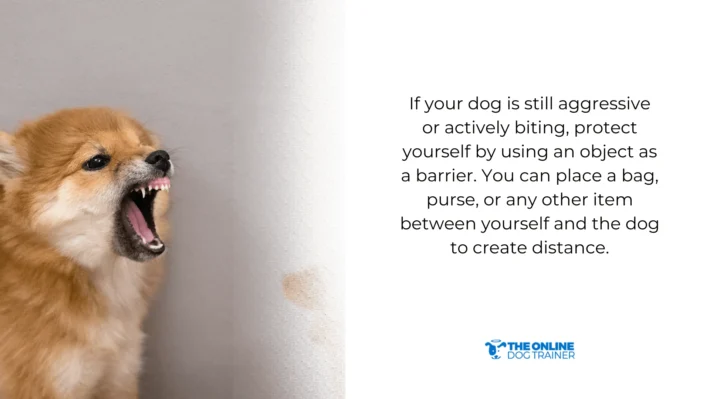
#4: Avoid Punishment or Yelling:
Here's what I want dog owners to remember: more often than not, a dog bites to defend. Not intentionally hurt.
When a dog‘s not trained, biting is a natural response for “I'm going to protect my mom and dad!”
So when you shout at the dog for doing what they think is right, this will outrightly confuse them.
My program, the Dog Calming Code, can help you address biting issues like this.
#5: Assess Injuries
Check yourself or others involved for any injuries. If necessary, seek medical attention for bite wounds. Remember that even minor bites can lead to infections, so it's important to clean and disinfect the wound promptly.
#6: Secure the Dog
If you're in a public area and the dog is stray or uncontrolled, try to secure the dog safely by confining it to a fenced area or calling local animal control for assistance.
#7: Report the Incident
If the dog belongs to someone or the incident occurred in a public space, report the bite to the appropriate authorities, such as animal control or the police. Providing accurate information can help prevent future incidents and protect others.
#8: Get Some Help From a Professional Dog Trainer
Consult a trainer, or veterinarian experienced in canine behavior. They can assess the situation, determine the underlying cause of the biting behavior, and provide guidance on how to address it effectively.
If working closely with a dog trainer isn't possible now, I suggest considering an online training program like my groundbreaking course, The Dog Calming Code.
With this program, you can learn the step-by-step techniques to address your dog's issues by watching instructional videos at your own pace from the comfort of your home.
It provides the missing link to training that most trainers and vets are unaware of, giving you the tools you need to effectively train your dog.
#9: Educate Yourself
Learn more about dog behavior, body language, and communication to better understand why the biting incident may have occurred. This knowledge can help prevent similar situations in the future and promote safer interactions with dogs.
(And if you want to start now, check out my Dog Calming Code™️ program!)
JOIN HERE TO GET FREE ACCESS TO DOGGY DAN'S BESTSELLING TRAINING PROGRAMWhat To Do If a Dog Bites: What To Do If Your Dog Has a Pattern of Biting
No matter how great your dog is, biting should always be taken seriously.
After all, if your dog has bitten once, he has the potential to do it again.
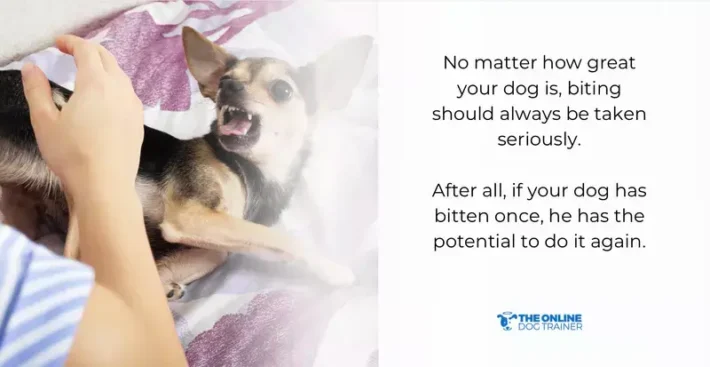
While you're getting the help you need in terms of training, there are a few safety precautions I advise you put in place to keep everyone safe—especially if you have kids or other people who come in and out of your home.
First: If A Dog Bites, Ensure Safety All The Time
Safety Tip #1: Use a Humane Muzzle
Muzzles are a great tool that can be used to keep people and other pets safe from a dog who bites. To see what humane muzzles I recommend, click here to check out my guide to muzzles.
Safety Tip #2: Use a Short Leash
When taking your dog for a walk or anywhere in public, ensure he is kept on a short leash so he can't get too close to people. If in doubt simply turn and walk away.
Safety Tip #3: Use a Crate
If you have people coming to your home to visit, crate your pup. It's always better to be safe than sorry. There is no need to have your pup or dog running around just because there are friends over.
Second: Be Prepared to Put Your Dog's Needs before Your Own
After a dog bites someone, it's possible that tough decisions may have to be made about your pup.
While I believe it's important to try to keep training your dog in your own home, you may also feel the need to consider the following…
I personally am a huge fan of ‘No Kill Shelters', shelters that are based on the belief that all dogs can be saved with the correct set up in place such as https://bestfriends.org/
Third: Rehoming Dogs When They Bite
I hate the idea of having to rehome dogs.
However, there are some circumstances in which it might be necessary—and even beneficial—for your dog.
For example, if your dog hates noise and you have three screaming kids under the age of 5, then it may not be the ideal match.If you must consider rehoming your dog, do your best to find a close friend or family member who can help instead of dumping your dog at a shelter. That way, you can always visit and lend a hand.
Fourth: Putting Your Dog Down When They Bite
Before putting your dog down, I can't encourage you enough to give my Dog Calming Code program a try.
If your dog really has become aggressive due to illness or old age, biting might be a sign that he can no longer deal with the pain and stress of life anymore.
Although this is very rare, I personally would only consider this to be the situation if a vet believes it to be the right thing to do due to a physical issue.
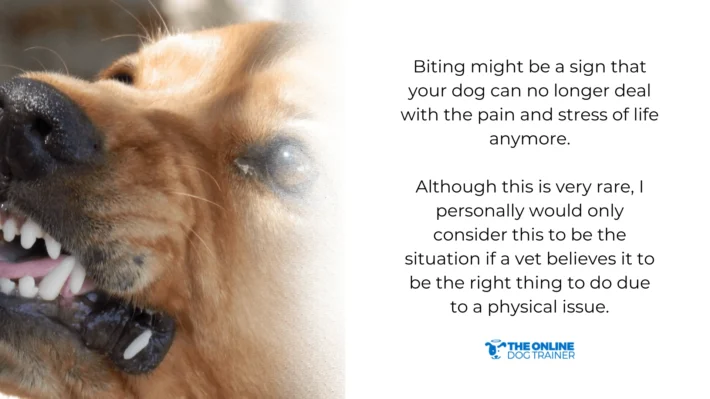
While it's never easy to say goodbye, we can give our dogs the gift of a peaceful passing.
REGISTER HERE AND DISCOVER HOW YOU CAN STOP AGGRESSION FASTER!My Dog Got Bit By Another Dog And Is Acting Weird
It's a frightening experience when another dog bites your beloved canine companion. Even the gentlest dog can find themselves in an unexpected dog fight or a more severe dog attack. The immediate aftermath can be chaotic, but knowing what to do can make a significant difference in your dog's recovery.
The priority is assessing your dog's bite wound. While some injuries may appear superficial, a dog's bite wound can hide more profound trauma, including puncture wounds that are difficult to see. These can quickly become infected. In some severe cases, a dog attack can lead to broken bones or even serious or fatal damage.
Once your dog is safe, contact your veterinarian immediately, even if the wound seems minor. They will thoroughly examine your dog's injuries, clean the wound, and likely prescribe pain medication and dog antibiotics to prevent infection.
Navigating the aftermath of a dog attack also involves interacting with the other dog owner. This can be a delicate situation, as both dog owners are likely stressed. Exchanging contact information and details about the biting dog is crucial for legal and medical reasons. If you have pet insurance, now is the time to contact them to understand what costs may be covered. While no one wants their dog to be involved in a dog fight, being prepared for the potential medical and financial implications can help ease the burden during a stressful time.
Conclusion: What To Do If A Dog Bites? Ask For Help!
If you're struggling with a challenging dog, knowing you're not alone is important.
Dogs are amazing animals, but they require a lot of love, training, and patience to reach their full potential.
You can start addressing aggression, fear, anxiety, and stress (some of THE biggest triggers of biting accidents) you can check out my Dog Calming Code program.
If you're considering giving your dog away, I want to encourage you to put that thought on hold and, instead, download a FREE copy of my guide 5 Things You Can Do Today to Make Dog Ownership Easier.

~Doggy Dan


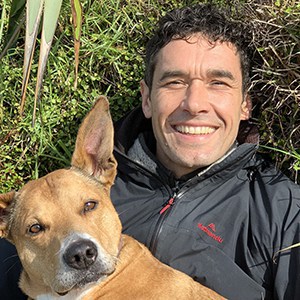

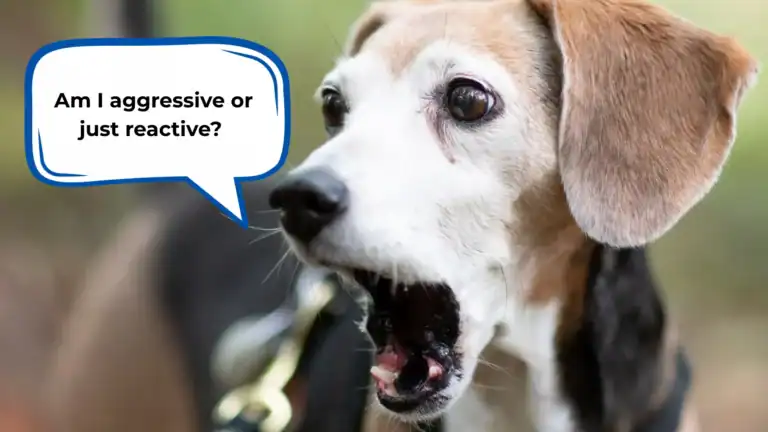
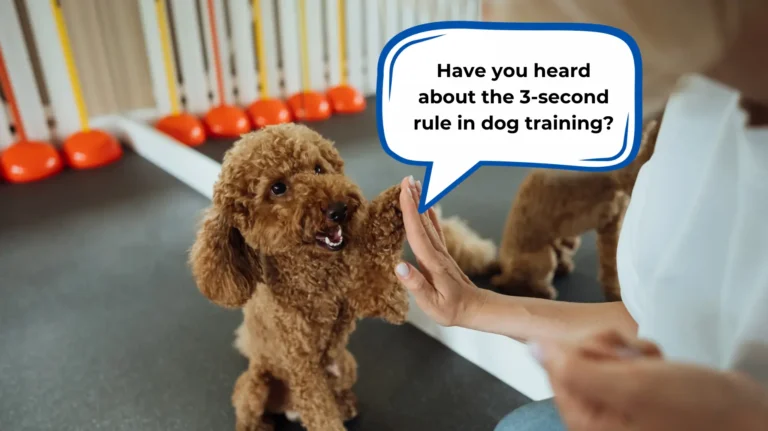
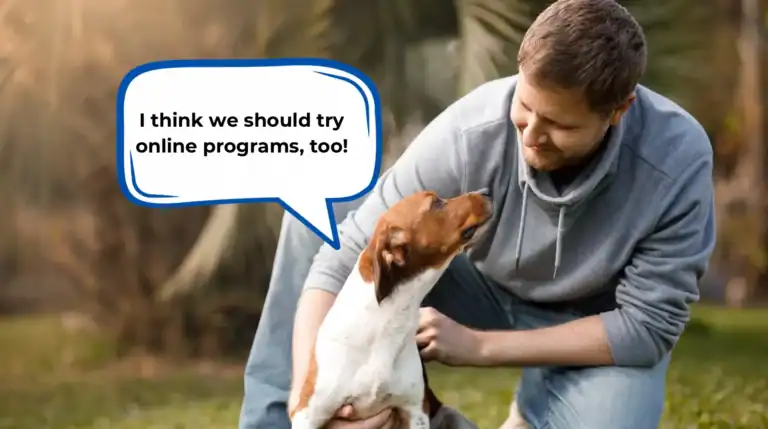
32 Responses
Hi There Doggy Dan,
I have a 2 year old collie cross, who developed aggressive behaviours very quickly (in the space of about 2 weeks) 10 months ago. He has bitten multiple people, all strangers (to him) coming onto our property. His aggression is purely territorial and protective, and only occurs at home and now more recently in the car. He is very reactive when he sees or hears people walking by, barking, growling and pacing. His bites have always been inhibited, but are still serious.
He is otherwise superbly trained, extremely intelligent, receptive and is beyond perfect out on walks where he has no desire to protect his space. He was well socialised with dogs, people and environments from a young age and the turn in his behaviour came as a complete surprise. Until then he was happy to meet anyone and everyone coming into his home space calmly and never reacted to passers-by’s. Once he has met someone he enjoys their company a lot and is very friendly and respectful. He has no problems with seperation anxiety, no resource guarding, walks on a loose leash.
I have had him checked at the vet, have muzzle trained him and have had extensive training sessions over the past 9 months with a professional dog behaviourist. We have tried counter conditioning and desensitisation, by our trainers recommendation, using food and play as a reward for desired behaviour dependant on the situation.
This has not worked effectively despite our consistency. He will be responsive while we’re training but as soon as I’m caught off guard (without treats in hand) he will revert back to being reactive. He is smart, and knows when I have don’t have treats. He does listen, at times, but if he goes over threshold it’s too late and I have to remove him from the situation.
The car has been especially challenging, and we’ve had some close calls with people trying to pet him through the window etc. as he appears friendly, but suddenly explodes.
His behaviour has very clear triggers but sometimes he doesn’t get as triggered, or sometimes not at all which makes it unpredictable. It’s almost like he perceives some people are a threat and others aren’t. At the moment I have resorted to just managing him in a way that minimises his access to triggers and that he cannot bite again – crating him when we have visitors, preventing his access from the front garden where people walk by on the other side of the fence, and being extremely careful when we’re out and about in the car.
I have been going over and over everything and anything I can possibly to do calm his anxiety and teach him it’s not his job to protect me or the space, but nothing has worked and it’s honestly breaking my heart as he used to be a dog I could take anywhere and do anything with. He is an incredible dog, and I will keep trying. Any advice would be so appreciated. I would love to do your online course, when I have the means.
You can start with the free webinar. This will help you understand WHY he’s behaving this way. That’s where to begin. You can’t “train” him without first understanding where he’s coming from. Check out the free webinar, you’ll love it!
The Reactivity Webinar happens weekly on Wednesday and Sunday at 3pm EST (USA time). The link for the webinar is here, and you can choose this week or the following week: http://theonlinedogtrainer.com/reactivity-webinar/
If you register, you’ll get the recording via email after the webinar
Hi there,
My 3 year old cattle dog bit me today on the arm which required 4 stitches and also on my lower hip. The hip one luckily because of clothes only resulted in bruising. I was just putting him on the lead while we were going out to try and safe the grass. he runs up and down the fence barking at anyone who walks by. He has gone at me before and has also bit my daughters friend and goes at our older border collie luckily only mouthing so far. He has bitten 2 other dogs before, managed to get out the automatic gate as it was closing but did not draw blood. I am actually scared of him now. Should I consider the option of getting rid of him? I am worried that it will be a lot more serious next time and worried about the outcome! Our Border Collie is older and deaf and blind and worry about her having to deal with him in her older age. But he has had a few chances now and it is getting worse. Many Thanks Diana.
The most important step in correcting this behaviour is to understand WHY your dog is behaving this way. Very often this is to do with them thinking they are more important than they actually are – hence (in the dog way) “telling off” the human who tries to correct them. When you are able to communicate to them that they can switch off and relax because the humans are in charge, everything changes and becomes a lot easier.
Here is a link to a blog post that explains more about dog aggression:
http://theonlinedogtrainer.com/the-ultimate-guide-to-dealing-with-dangerous-dog-aggression-issues/
… and here’s one about dogs biting their owners : http://theonlinedogtrainer.com/when-dogs-bite-their-owners/
You would also benefit from one of my programs. I’d recommend The Complete Pack http://www.theonlinedogtrainer.com
All the best, Dan
Hi there, we have a 10mnth old rescue whippet X collie pup. She’s generally very gentle and loves to be held and cuddled. Recently she become quite resource guarded and not my let when I walked past her when she was eating.. it seems better this week so I’m not sure what was bothering her. She barks incessantly in the evenings when we sit down to relax. A high pitched ‘I need you to listen to me’ type bark. This after excercise etc. She bit me last night when I moved in my bed and but my daughter in the face this evening, she made the same mistake! She is really such a sweet gentle soul but the biting does break trust!
The most important step in correcting this behaviour is to understand WHY your dog is behaving this way. Very often this is to do with them thinking they are more important than they actually are – hence (in the dog way) “telling off” the human who tries to correct them. When you are able to communicate to them that they can switch off and relax because the humans are in charge, everything changes and becomes a lot easier.
Here is a link to a blog post that explains more about dog aggression:
http://theonlinedogtrainer.com/the-ultimate-guide-to-dealing-with-dangerous-dog-aggression-issues/
… and here’s one about dogs biting their owners : http://theonlinedogtrainer.com/when-dogs-bite-their-owners/
You would also benefit from one of my programs. I’d recommend The Complete Pack http://theonlinedogtrainer.com
All the best, Dan
Hi Dan. I have a 2yr old female GSD. We started basic training at the age of 6 months but had to stop due to lockdown during Covid and never went back as i became unemployed at the time and could not afford further training. We still did some of the basics at home until I started working again and training started to become less than what I wanted. She now charges after people and bites their feet the moment we open our gate. She also barks aggressively at the gates of the houses where there are dogs as well. I can’t take her for walks as she literally pulls me into a run the moment we hit the road. Is it too late to change her behaviour or what can I do? Mind you she also has one of her siblings on the property.
Hi Chantel, I do want to start off by saying that you can absolutely turn your dog’s behaviour around. She is just doing the job she feels she needs to do to keep her family safe, but you can start to show her that this is actually not something she needs to do anymore. The behaviours you describe are ones we deal with regularly and if you take a look at my membership website (TheOnlineDogTrainer.com) then you will see we have resources to help with each of the behaviours you outline, making it so much easier for you to know where to start. The key is to educate you first, and when you start to change your behaviour you dog will also change hers! All the Best, Doggy Dan
Hi Dan, I had an incident with my dog a couple of days ago. We were on a walk, and my dog is on a leash, and I feel. I was laying on the ground, still had control of the leash and a women came by and asked if I needed help and I told her I was ok, but she came closer to maybe help me up, and my dog bit her hand. She turned and walked away.. I apologized of course, and I could tell she was in some pain, but no blood I dont think. Anyway, I am concerned about the aggressive behavior but someone told me he was protecting me.. Is that a possibility? He is a Black mouth Cur and is very protective by nature. I read some of your blogs and am thinking maybe I need to use a muzzle. I would like to hear from a professional what to do.
Hi Monique…..it is likely your dog was trying to protect you both. A stranger approaching is something he would have seen as a potential threat, especially if that stranger is really close. The fact that you were also lying on the ground, would have made you appear more vulnerable in your dog’s eyes, and this could have increased his desire to protect you and keep you safe. If this happens in the future then keep your dog close to you and on a shorter leash for greater control, maybe even sit or stand up, and reassure the stranger that you are ok and would prefer them to give your dog a little space. If your dog is generally reactive towards strangers then that’s definitely something my membership website will help with. All the Best, Doggy Dan
Took in a 20-month-old Rottweiler a month ago from family who were moving and wouldn’t keep him. Just neutered, and plan socialization training in another month (vet suggested wait a month). Never exposed to other pets, and now when we walk, he goes into Kujo snarling and STRONG pulling, which I can (just) handle. With no socialization, I attributed it to that. However, for some of these he has turned and tried to bite me (we always have a muzzle, so no damage), which I found a little alarming.
Anyway, while caressing him last night, he suddenly gave me a deep bite. A moment later, it was like nothing ever happened (except I had blood sprayed all over the couch, rug, and reading chair.) Now, I’m afraid of him and uncertain how to proceed, if he might badly bite me again without any warning (no whimper, whine, growl, staring, nothing! No wound or other sensitivity that I know of where I was petting.
How do I interact with him from now on? Muzzle whenever he isn’t being fed? Something else?
Hi Joel….settling into a new environment/home can be a really unsettling time for dogs, especially those who have had limited socialisation. My advice is to take things slowly so as not to overwhelm your dog, and keep walks really short so he has time to get used to all the new things going on around him. He will be trying to wok out what his role is in his new family and the way that you interact with him is a really important part of this process. Using a muzzle for safety is smart but used in isolation it will not solve his behaviour…..only the information you give him will do that and there is absolutely no need for you to use force or intimidation.
My website TheOnlineDogTrainer.com will be a really helpful place for you to start as it details how to overcome this type of behaviour…..we also have an introductory offer going with a trial period of 3 days for just $1USD. This is definitely a behaviour you can overcome, with the right information and a little patience. All the Best, Doggy Dan
Hi Dan
We have a 4 year old tri Cross (jack,corgi and chiwawa) recently he has bitten my daughters friend. He has also bitten her other friend around 6 months ago. We have had him approximately 10 months and are really concerned now.He fits into our family perfectly apart from he does not like my daughter playin with her friends. Can you help as we don’t know what to do for the best.
Chris
Hi Chris…believe it or not this is actually a common issue. Whilst not all dogs bite/nip many will get excited when strangers or guests are in the house. Some dogs can be really susceptible to the energy levels of children and when play is loud and exciting then a dog’s behaviour can escalate….often they aren’t aware that the children are simply playing and they will try to micro-manage the interaction, which is why adult supervision is so important. Having your dog on-leash when visitors arrive will allow you to make sure he is genuinely calm around visitors before he is allowed a little more freedom. Also asking your visitors to delay greeting him until he is calm, and then inviting him to them to say ‘hi’ rather than approach him to do so, is a great way to ensure he is comfortable with their presence. If you can see he is getting a bit excited or agitated by your visitor then calmly put him back on-leash to calm down again, or you can place him in another room. Calm and consistent actions from you will allow him to understand that he needs to use more self-control….getting angry at him and shouting is not a great way for him to learn. My membership website My website TheOnlineDogTrainer.com has a lot more information that will help you understand what is going on and how to calm things down…maybe take a quick look…its a $1USD trial for 3 days…All the Best, Doggy Dan
Good evening,
I have a 2.5 year old old English Shepard. Last year he got sick and it ended up being that when he was neutered (before we got him) they left a testicle. He has a surgery and has it removed but since then it seems he has gotten more and more aggressive (bitten a few people). I’m wondering if his health issue could be the cause or of there are some other things. He is great 95% of the time. Most of the bites were when he was being petted and he gets really aggressive when he is put in his crate for bedtime and meals. Any thoughts on what we can do to fix this?
Hi Timothy….any significant incident has the ability to change a dog’s behaviour, particularly if it was a little traumatic or unsettling for the dog involved. The good news is that you can change your dog’s behaviour towards strangers by understanding how he feels about them in the first place. Most dogs see strangers as potential dangers and when those dangers invade their personal space, or get too close, the dogs can feel really unsettled. For dogs that fit into this category I always recommend allowing them a little time to get comfortable with a strangers presence and if they do seem calm and relaxed you can ask the stranger to invite your dog to go to them for a pat rather than have them approach your dog. This allows your dog a choice, if he is comfortable with them then he will approach them when invited, but if he chooses not to then he should be allowed that right. If he approaches the stranger without being invited then they should avoid interacting with him as this is not a sign he is ok with their presence, he is more likely ‘risk assessing’. We cover this issue on my membership website….…maybe take a quick look…its a $1USD trial for 3 days…all the best Doggy Dan
This is the first time my dog has bitten someone. And the person will probably need stitches, I’m just in shock that my dog did that. My dog mets people, I walk him to parks, always have him on a leash. When he see other dogs he whines and get excited, but other than that nothing much. So I really don’t know what to do.
Hi Mirsa, I always like to remind dog owners that their dog’s view strangers as potential threats. Of course we know that strangers mean no harm but our dogs don’t necessarily feel that way. If that stranger then invades the personal space of a dog then it can leave them feeling very unsettled and anxious, in some cases nipping to try to defend themselves. Think about how we may react if a stranger came right into our personal space. If a stranger would like to meet your dog try allowing a little space and time for your dog to get used to their presence to start with. If your dog is calm then ask the stranger to invite your dog to them, rather than approach your dog to give him a pat….this allows our dogs a choice and protects their personal space. If you analyse what occurred, as startling as it was, you might be able to identify why your dog behaved the way they did. Best, Doggy Dan
My dog attacked my other dog, luckily I was right there and broke it up, but while I was getting the agresser to stop attacking he bit me.
I know there is an underlying health issue with him, that his vet and I are trying to understand what’s going on, but haven’t been able to diagnose yet. So I know the issue is health/insecurity since he feels different, and were trying to pinpoint the health issue, but what do I do until we can figure out the health side?
Hi Rachel,
When dogs are unwell they can start to feel really vulnerable, not to mention less tolerant, and they can over-react to situations they never normally worried about. Lashing out at your other dog is likely his way of trying to retain his position in the family/pack, but it may also be that your other dog is putting a little pressure on your unwell dog, which happens more often than you think! The good news is that you can help your dog feel more settled and allow him to relax again…..even while you are still getting to the bottom of his medical issues. My website TheOnlineDogTrainer.com shows you very clearly how to achieve this…maybe take a quick look…its a $1USD trial for 3 days…all the best Doggy Dan
Hi I have a 2 1/2 boxer, we recently had to take him to my in laws because we were moving and weren’t able to keep him with us. I visited him consistently and I felt that situation caused him to become aggressive, he bit my bro in law but he tried to pet him even tho he was growling before he tried to touch him. He ended up biting me because he was upset for being left there and now it’s been about 6 months and he was outside with my daughter when she tried to pet him and he bit her. I don’t understand what to do and am at the point of maybe getting rid of him. I love him and just want to do what is right. What should I do?
Hi Esmeralda,
Changes to a dog’s routine and environment, especially moving them into a new home, can be a really unsettling experience for some dogs and it can leave them feeling anxious and overwhelmed. As a result of this their behaviour can change. Always remember that a growl is a warning to back off, and it’s one that should be listened to. One quick tip to help avoid your dog feeling the need to growl/bite…..always invite him to you first before giving him any affection or attention…avoid going to him to do so. This means he has a choice in whether or not he wants to interact, and that alone can make a BIG difference. Also, when you go to visit him try waiting a few minutes before saying ‘hi’ to him, especially if he’s excited or trying to get your attention.
Having said all of the above, safety is paramount and so young children should always be supervised when they are around dogs…even those that are familiar to them.
If you feel confused about your dog’s behaviour then seeking professional advice is a good idea, maybe even a trip to the Vet to ensure he is physically ok. My website TheOnlineDogTrainer.com is another great option to inform yourself…maybe take a quick look…its a $1USD trial for 3 days…all the best Doggy Dan
My dog is only 1 year old and mouthing a lot , bit me few times when Im on the phon and has become annoying She is a havanese and so cute but the bit
ing is discouraging and today she bit me hard on my finger it was black and blue and really hurt. The bite hurt my feelings as well I admit I spoil her like my own child and being bitten hard made me wonder if getting rid of her might become a choice and difficult to handle.
Hi Deanna,
The first thing I want to say is that if the biting seems overly aggressive or you feel scared/intimidated by your dog’s behaviour then having a professional assist you, in a one-on-one basis, would be really helpful. Identifying the cause of the behaviour is important in developing strategies to overcome it. I will say that in many cases where the mouthing/biting would not be considered to be motivated by aggression then other causes may be attention seeking or the desire to direct/control your behaviour.
It’s important to look at the times and scenarios in which your dog does the behaviour…..if she does it consistently when you are on the phone then my gut feeling would be that she is trying to gain your attention, and so telling her off or responding verbally is not the best approach….it will only show her that the behaviour works for her and she will likely continue to do it. If she mouths you or bites you then I would recommend immediately placing her in another room on her own for 5-10 minutes, or if you feel unsafe then you leave the room she is in and prevent her from following you by closing the door on her. This will show her that this behaviour no longer gains your attention AND if she continues to do it then she will actually find herself on her own for a little while. You will most likely need to be really consistent with how you respond to her and she may start to test you a little as well. Try to remain calm and always stay safe! If you would like some further information about how you can solve this behaviour my website TheOnlineDogTrainer.com is also a great place to start…maybe take a quick look…its a $1USD trial for 3 days…all the best Doggy Dan
my dog bit me today while he was outside by the fence, he was digging around some leaves, he backed away and I then moved the leaves with my hand and he lunged at my hand and bit it, cant understand why he did this, please offer any suggestions
Hi Mary,
I hope you weren’t too badly injured! Without knowing a few more details around this particular scenario it’s really hard to identify what really motivated your dog’s behaviour. It may have been that there was something in the leaves he was concerned about and he was warning you to not touch anything, he may have felt possessive of whatever it was that he was digging for, or he may just have accidentally bitten your hand in an attempt to get to whatever it was he had been digging for. If he is not normally known for biting then I would say there was no ill intent meant by it, you may have just accidentally gotten in the way and he bit you by mistake. If you are concerned about his behaviour going forward, then it may be best to seek advice from a professional. Best, Doggy Dan
Dan I have a two year old that doesn’t like other dogs or ppl that she don’t know in her space if they do get in her space she charges an I have her at a behavioral therapy place an she has been there a month . But the lady said that she should be put down. She has anxiety I don’t want to killer is there anything more I can do. no she not fixed plz help
.
Hi Tiffany,
A lot of dogs don’t like other strange dogs too close and in their personal space…they can find it unsettling and threatening. Remember that all dogs view other dogs as a potential threat to their safety, it’s just that some are way more sensitive about this than others. Given the right information they can learn to relax and trust their owner to keep them safe, so the most important aspect in changing her behavior is that you are also shown what to do. The issue with board and train places is that your relationship with your dog and how you behave is the biggest factor in overcoming her behaviour, and if you aren’t involved in the training process then the behaviours will likely just re-emerge when she returns home. Educating yourself and gaining the knowledge that will help your dog learn to trust you and relax around other dogs is vital. My website TheOnlineDogTrainer.com shows you very clearly how to achieve this…maybe take a quick look and see what you think…its a $1USD trial for 3 days…all the best Doggy Dan
Great article, Doggy Dan! It is so hard to make decisions after one’s dog acts out aggressively, especially when one is not an expert in dog behavior. One being me! Haha! Unfortunately I did not read this article until later on, but found my own way down a good path of enlightenment and more control after my dog put me in a position of having to do so. If I had seen this article at the beginning, I could have had a much clearer plan sooner and less anxiety sooner! Our dog has turned into a real nice boy, but more importantly, I was able to turn into a more knowledgeable, responsible dog handler thanks to your website in addition to some other local resources. I had to learn to read him and accept his limitations and put safety first.
Hi Stacey, I’m really glad you enjoyed my Blog! It’s something we know that many dog owners go through and understanding the realities around the situation can really take what is a very stressful time, and bring some clear thinking to the fore. I’m really glad you found a path that allowed your dog to relax and reach his full potential, and well done in taking on the responsibility of working him through his behaviour. Best, Doggy Dan!
It would never cross my mind to get rid of my dog. My priority would be to protect him from whatever the cause of such an incident was, through trading, equipment or treatment.
Hi Laura,
Many dog owners do feel the same way that you do! I guess the whole point about the Blog topic was to take into consideration all factors so that owners could come to the decision that best fit their situation. Best, Doggy Dan